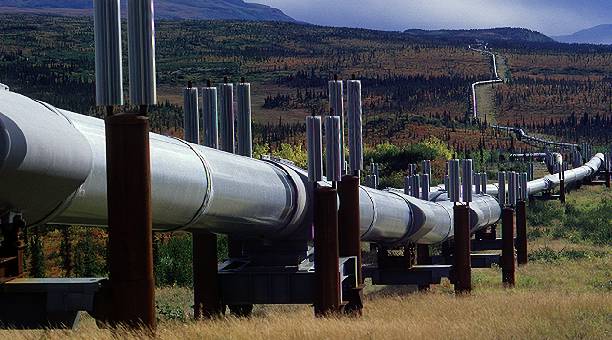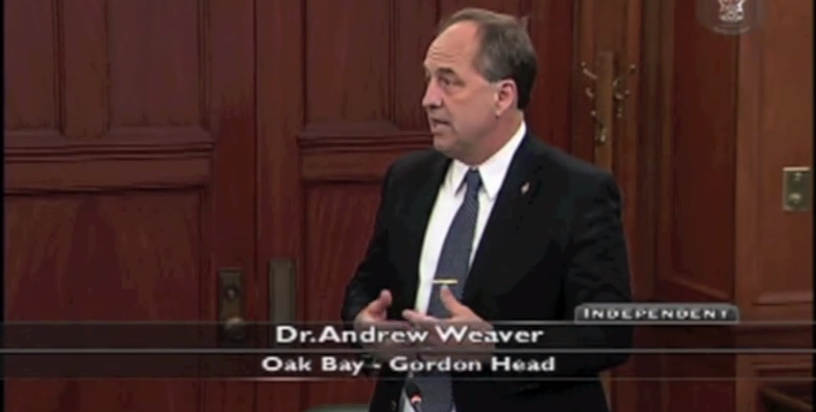Media
Kinder Morgan Responses Unacceptable
Media Statement: July 3rd, 2014
Andrew Weaver: Kinder Morgan Responses Unacceptable
For Immediate Release
Victoria B.C. – Today, Andrew Weaver MLA for Oak Bay-Gordon Head and Deputy Leader of the B.C. Green Party has submitted a motion to the National Energy Board, asking them to compel Trans Mountain to provide full and adequate responses to questions that he submitted as an intervenor in the Trans Mountain Hearing Process. Many of Trans Mountain’s answers to his information requests were “incomplete” and “unacceptable”.
As a part of the National Energy Board hearing process on Kinder Morgan’s proposed Trans Mountain pipeline project, Dr. Weaver submitted nearly 500 questions to the company. Dr. Weaver’s questions focused on the risk and impact of an oil spill, the scientific underpinning of its oceanographic analysis, and on the extent to which people on southern Vancouver Island were consulted. Trans Mountain, a fully own subsidiary of Kinder Morgan Canada, recently submitted its answers to Dr. Weaver’s questions.
“Many of the answers I received are simply unacceptable,” says Andrew Weaver. “They are refusing to consider any oil spill larger than a small fraction of a tankers cargo, and basing their oil spill analysis on a response capacity that simply doesn’t exist. The lack of substantive response shows a disregard for the essential role that intervenors play in the hearing process.”
Collectively over 10,000 questions were submitted to Trans Mountain as a part of the first stage of information requests. With the National Energy Board’s ruling to exclude oral cross-examination from the hearing process, intervenors will only have one more opportunity to submit follow-up questions to the company.
Many intervenors have argued that the decision to exclude oral cross-examination has severely constrained their ability to hold Trans Mountain to account on its evidence. These concerns will ultimately be put to the test in the coming weeks when the Board makes its ruling on the adequacy of Trans Mountain’s answers. Intervenors have until July 4th to submit motions to the NEB requesting a ruling be made.
“Given the massive outpouring of opposition to the Northern gateway pipeline and the serious concerns that have been raised about heavy oil spills, it is hard to believe that Kinder Morgan wouldn’t be doing everything possible to assuage the concerns of intervenors and all British Columbians” said Weaver.
Submission to National Energy Board from Andrew Weaver – download here.
Media Contact
Mat Wright – Press Secretary, Andrew Weaver MLA
mat.wright@leg.bc.ca
1 250 216 3382
Andrew Weaver calls on government to agree to independent mediation in teacher labour dispute
Media Statement: June 19, 2014
Andrew Weaver calls on government to agree to independent mediation in teacher labour dispute
For Immediate Release
Victoria B.C. – Today’s call for independent mediation by the BCTF represents an important opportunity to depoliticize the current labour dispute. Minister of Education Peter Fassbender has noted that he is open to the idea. Now it’s time for both sides to work hard to make it happen.
“It is hard to imagine how a settlement could be reached before the end of the month if this opportunity to introduce an independent meditator is not accepted” said Andrew Weaver. “I think British Columbians are tired of the negotiation-by-press conference that has been taking place, which does little but polarize discussions.”
While introducing a mediator is by no means a silver bullet for settling the labour dispute, it would represent a significant step in improving the dialogue between the two parties.
“While the negotiators battle out their entrenched, and what is perceived by many to be, at times, ideological positions, the ones who are paying the price are the children in the classroom, the teachers who teach them, and their parents at home” said Andrew Weaver. “The government set the stage for the crisis with their intransigent position regarding class size and composition negotiations in the face of two BC Supreme Court decisions. Now they have an opportunity to be a critical part in the solution.”
Media Contact – Andrew Weaver MLA
Mat Wright – Press Secretary
1 250 216 3382
mat.wright@leg.bc.ca
With a federal ‘Yes’ on Northern Gateway, it’s time for the provincial government to say ‘No’
Media Statement: June 17, 2014
With a federal ‘Yes’ on Northern Gateway, it’s time for the provincial government to say ‘No’
For Immediate Release
Victoria B.C. – The B.C. Green Party is calling the Federal Cabinet decision that approved Enbridge’s
controversial Northern Gateway pipeline deeply troubling for democracy. The majority of British
Columbians have consistently been opposed to the pipeline, as was reiterated with the latest Nanos poll,
showing 67% opposition.
“The Federal Government continues to ignore the will of British Columbians,” says Andrew Weaver, MLA
for Oak Bay-Gordon Head and Deputy Leader of the B.C. Green Party. “The fact is, Kitimat is opposed to
this project. First Nations are opposed to it. British Columbians are opposed to it. It’s time for the
Provincial Government to draw a line in the sand, and reject the Northern Gateway project.”
With the failure of the Federal Government to represent the will of British Columbians, the spotlight is
now on Premier Clark.
“The Federal Government is steamrolling this pipeline through the backyards of British Columbians.”
says B.C. Green Party leader Adam Olsen. “Premier Clark can stop this pipeline. I am calling on her to
do that today.”
Yesterday, Premier Clark reiterated that any heavy oil pipeline needs to meet her government’s five
conditions, concluding that “Enbridge hasn’t met them yet.”
One of those conditions is a world-leading marine spill response regime. This is complicated by the fact
that the tankers would be carrying diluted bitumen, a heavy oil that has been shown to sink when spilled
in the ocean, making recovery more difficult.
The B.C. Green Party is the only party with a clear stance calling for a moratorium on tankers
transporting this heavy oil, adding this as a sixth condition on top of B.C. Liberal’s existing five conditions.
The BC government has stated that they have the power to stop the Enbridge pipeline through the 60
required provincial government permits. Yet so far the government has largely sat on the sidelines,
neglecting to make any concrete commitments one way or the other.
“This is no time for political dances and electoral calculations. This is our coast they are putting at risk.
British Columbians expect Northern Gateway to be rejected by their provincial government, and we
expect it today,” added Adam Olsen
Media Contact – Andrew Weaver MLA
Mat Wright – Press Secretary
1 250 216 3382
mat.wright@leg.bc.ca
Media Contact – B.C. Green Party / Adam Olsen
Stefan Jonsson – Director of Communications
1 250 514 0288
stefan.jonsson@greenparty.bc.ca
Site C Joint Review Report Shows Major Obstacles for Approval
Media Statement: May 8, 2014
Site C Joint Review Report Shows Major Obstacles for Approval
For Immediate Release
Victoria BC – The Joint Review Panel’s report on the proposed Peace River Site C dam published today identifies major obstacles in the path for approval. While the report does not emphatically say yes or no to the project, certain sections highlight the permanent damage to the environment, farmland and wildlife the project would have. These include effects on First Nations rights, and lack of exploration of similar-cost renewable energy alternatives.
Andrew Weaver has pointed out that Site C is the wrong project at the wrong time when alternative energy, including geothermal, wind, tidal and small-scale hydro sources, coupled with existing dams would provide substantially improved firm energy and capacity. This approach would be less damaging to the environment and, distributed around B.C. It would provide future power requirements with better cost and employment outcomes. Geo-thermal, wind, tidal and smaller hydro projects would yield substantial economic benefit to communities, especially First Nations.
“The government should note the major obstacles outlined in the Joint Review Panel report on the Site C dam. The consequences on First Nations traditional fishing and hunting grounds are a barrier that will strain already tense relations, should the project proceed” Said Andrew Weaver – “The entire policy around energy development in British Columbia needs review as the report clearly stated Geo-thermal, and other renewable sources, should be explored”
The Panel concluded:
1: On the environment and wildlife:
- “the Project would cause significant adverse effects on fish and fish habitat”
- “significant adverse effects on wetlands, in particular valley bottom wetlands”
- “the Project would likely cause significant adverse effects to migratory birds relying on valley bottom habitat during their life cycle and these losses would be permanent and cannot be mitigated”
2: On renewables:
“The scale of the Project means that, if built on BC Hydro’s timetable, substantial financial losses would accrue for several years, accentuating the intergenerational pay-now, benefit-later effect. Energy conservation and end-user efficiencies have not been pressed as hard as possible in BC Hydro’s analyses. There are alternative sources of power available at similar or somewhat higher costs, notably geothermal power. These sources, being individually smaller than Site C, would allow supply to better follow demand, obviating most of the early-year losses of Site C. Beyond that, the policy constraints that the B.C. government has imposed on BC Hydro have made some other alternatives unavailable.”
3: Regarding First Nations:
The panel:
- “concludes that the Project would likely cause a significant adverse effect on fishing opportunities and practices for the First Nations represented by Treaty 8 Tribal Association, Saulteau First Nations, and Blueberry River First Nations, and that these effects cannot be mitigated.” –
- “ concludes that the Project would likely cause a significant adverse effect on hunting and non-tenured trapping for the First Nations represented by Treaty 8 Tribal Association and Saulteau First Nations, and that these effects cannot be mitigated.3 –
- “ the Project would likely cause a significant adverse effect on other traditional uses of the land for the First Nations represented by Treaty 8 Tribal Association,and that some of these effects cannot be mitigated.” And
- “concludesthat the Project would likely cause significant adverse cumulative effects on current use of lands and resources for traditional purposes.”
4: For background information on Andrew Weaver’s position with respect to the value of distributed renewable energy production instead of Site C, please see:
http://www.andrewjweaver.ca/2013/10/17/wind-power-site-dam-cents/
For interview requests:
Media Contact
Mat Wright – Press Secretary, Andrew Weaver MLA
mat.wright@leg.bc.ca
1 250 216 3382
Question Period – Andrew Weaver calls on government to protect credibility of its 5 conditions for Heavy Oil Pipelines
Media Statement, May 8th 2014
Andrew Weaver calls on government to protect credibility of its 5 conditions for Heavy Oil Pipelines
For immediate release
Victoria, B.C. – Andrew Weaver, MLA for Oak Bay – Gordon Head and Deputy Leader of the B.C. Green Party, calls on the B.C. government to explain its silence on the National Energy Board’s Kinder Morgan – Trans Mountain pipeline hearing process, as local governments and other intervenors raise strong concerns about a defective process.
The government missed an important opportunity to weigh in on a key motion, that called on the National Energy Board to introduce oral cross-examination into the hearing process.
Oral cross-examination played a critical role in the Joint Review Panel hearings on the proposed Northern Gateway Pipeline. The cross-examination period lasted more than 90 days with the Province itself requesting over 8 hours of that time. It was essential in assessing the extent to which the project met the B.C. Government’s 5 conditions, and helped uncover serious gaps in Enbridge’s evidence ultimately leading the province to conclude that it could not support the project at that time.
However, oral cross-examination has been replaced in the current Trans Mountain hearing process, with only two opportunities to submit written questions. First Nations groups, cities including Victoria, Vancouver and Burnaby, and many other intervenors have raised significant concerns about the ability to adequately assess Trans Mountain’s evidence. This concern is amplified by the short timeline that gives intervenors little more than one month to read the 15,000 page application and submit their first round of questions.
This precedent-setting change comes along with a federally legislated timeline that shortens the length of the Kinder Morgan hearing process and all future hearings. However, the need to ensure fairness must remain paramount and at least one intervenor–Elizabeth May, Member of Parliament for Saanich-Gulf Islands and Leader of the Green Party of Canada–is considering legal action over the removal of oral cross-examination.
“The final argument that the government prepared at the conclusion of the Joint Review Panel hearings on the proposed Northern Gateway Pipeline was a substantial and articulate document that relied heavily on oral cross-examination to make the case for why the Province was unable to support that proposal at this time. The fact that the government has remained silent on the absence of oral cross-examination in the Trans Mountain hearings, raises significant concerns, and is putting the credibility of its 5 conditions at risk.” said Andrew Weaver.
Background Documents:
Backgrounder 1 – Comparison of NGP and TMP
Media Contact:
Mat Wright – Press Secretary Andrew Weaver MLA
mat.wright@leg.bc.ca
1-250-216-3382
The Hansard transcript of the Question Period interaction is reproduced below.
A. Weaver: On April 14 Robyn Allan, one of 400 interveners in the Kinder Morgan hearings, submitted a motion asking the National Energy Board to introduce oral cross-examination into the process.
I joined many other interveners in writing a letter of support for Robyn Allan’s motion, as I felt this was the best way to formally express the importance of such cross-examination.
Madame Speaker, the government had ten days to submit their own letter of support, but they didn’t. A letter from the province would have had a profound influence on the NEB. Yesterday the NEB ruled on Robyn Allan’s motion and a similar motion tabled by MP Elizabeth May, dismissing their requests for oral cross-examination.
My question is to the Minister of Environment: given the government’s own comments that oral cross-examination of Enbridge was an essential part of determining whether or not the project met their five conditions, why did the government not take this opportunity to stand up for British Columbians and formally request oral cross-examination in the NEB hearing process?
Hon. M. Polak: I thank the member for his question and thank you for alerting me to his interest in the matter.
With respect to the National Energy Board hearings, I know the member is aware that they are a body that designs its own standard for how those hearings occur that we as a province do not influence.
Nevertheless, to the member’s question, the oral cross-examination, direct cross-examination, is not the only way in which one can put forward a case. In fact, there are still opportunities for participants to ask questions of Kinder Morgan and present their own information and perspectives to the panel. Interveners have the option to file detailed written information requests that Kinder Morgan is obliged to respond to — and in fact, in writing.
Also, interveners have the ability to address the review panel in person and to make their arguments and file written evidence.
With that knowledge, Madame Speaker, we determined that the opportunities were still sufficient for us to provide as strong an argument for our five conditions around Kinder Morgan as we did in the northern gateway hearings.
A. Weaver: Thank you to the minister, through you, Madame Speaker, for the response.
Oral cross-examination was essential to assessing the extent to which the project met the government’s five conditions. It uncovered serious gaps in Enbridge’s evidence and led the province to conclude that it could not support the project.
For the Kinder Morgan pipeline expansion project, oral cross-examination has been removed by the NEB. On April 23, I submitted an open letter to the Premier asking her to consider formally calling on the National Energy Board to introduce oral cross-examination. Two days ago I received a response that stated the following: “The province will use every forum available to ensure that the five conditions are met.”
I respect that response. However, my question to the minister is this: does the government believe that two written requests are sufficient to assess the meeting of the proposal with its five conditions? And if not, what other forums is the government using to ensure that it will receive sufficient information to assess its five conditions?
Hon. M. Polak: Again, I thank the member for the question. He will no doubt be aware that the province has not only committed to participating in the process, but we’ve actually been making our preparations to participate for months now as we approach the deadlines for submission.
For us, we still believe that with respect to our ability as interveners to request information in writing from Kinder Morgan…. We believe that we can do that in a detailed way that will provide us the information to evaluate. We also believe that we can provide to the panel, in person, an effective argument on behalf of our five conditions.
But it’s also important to note that the passage through the NEB process successfully is only one condition for us as a province. If we are not provided with sufficient evidence — not just commitments, but sufficient evidence — from the hearings, we certainly will maintain a position that upholds our five conditions.
We have seen that at the end of the northern gateway hearings when we concluded with a submission that, in fact, presented a lack of support from British Columbia. We will take the same approach here, entering neutral if we’re not provided with sufficient evidence, we will take the same approach.







